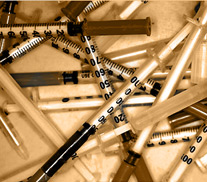What is Heroin Addiction
According to the World Health Organization: "Drug addiction is a state of periodic and chronic intoxication detrimental to the individual and to society, produced by the repeated consumption of a drug (natural or synthetic).”
Characteristics of heroin addiction (as any other opioid addiction) include:
- An overpowering desire or need (compulsion) to continue taking the drug and to obtain it by any means even being aware of all negative consequences of using the drugs.
- A tendency to increase the dose of drugs to achieve desirable effect. Tolerance is the body's physical adaptation to a drug: greater amounts of the drug are required over time to achieve the initial effect as the body "gets used to" and adapts to the intake.
- Creating both psychological and physical dependence on the effects of the drug. (Development of abstinence syndrome - situation when absence of the drug in a body causes set of unpleasant symptoms which can be fixed up by taking another dose of dope).
 Heroin addiction is a primary, chronic, psychiatric and neurological disease, with genetic, psychosocial, and environmental factors influencing its development and manifestations. It is characterized by behaviors that include one or more of the following: impaired control over drug use, compulsive use, continued use despite harm, and craving.
Heroin addiction is a primary, chronic, psychiatric and neurological disease, with genetic, psychosocial, and environmental factors influencing its development and manifestations. It is characterized by behaviors that include one or more of the following: impaired control over drug use, compulsive use, continued use despite harm, and craving.
Heroin withdrawal symptoms
If and when a person comes down off heroin withdrawal symptoms show up in a period from 6 to 24 hours and further progressively develop during the next 72 hours . Abstinent syndrome is a painful period from detoxing off of the heroin effects. Without medical help this condition (so called “cold turkey”) can last up to 5-6 days.
 Heroin withdrawal symptoms include:
Heroin withdrawal symptoms include:
sickness, hot and cold flashes, goose bumps, a running nose, stomach ache, sweating, deep pain in arms and legs, vomiting and diarrhea, convulsions, uncontrollable body movements, restlessness, insomnia, irritation, anxiety.
Withdrawal symptoms disappear as soon as heroin is used again. That is how the user easily ends up in a vicious circle.
Mental dependence means that the user desperately, anxiously wants to use the substance again and again and doesn't feel comfortable without it anymore.
Heroin sedates both physical and mental pain, which makes people with serious social and medical problems (homeless, abused, unemployed, with mental disorders ) susceptible to heroin. But because of the highly addictive nature of Heroine anyone from normal, ordinary people can easily become dependent. That is why experimenting with heroin is so dangerous.
PHYSICAL AND PSYCHOLOGICAL (MENTAL) DEPENDENCE ON HEROIN.
Heroin addiction is characterized by development of both components of addiction: physical and psychological dependence on heroin.
Physical dependence on heroin is a state of health condition that is manifested by a specific withdrawal syndrome that can be produced by abrupt cessation or rapid dose reduction of narcotic, or by administration of narcotic antagonist.
Physical dependence on heroin means that the body reacts when use of the substance is stopped by presenting withdrawal symptoms. It doesn't mean that anybody becomes addicted after using heroin only once, but if the use becomes more frequent, physical dependence easily grows because of the development of tolerance.
TESTING FOR HEROIN
Heroin and its metabolites like any other opiate can be detected in urine for 24 hours and in hair samples for as long as the hair has been growing.
Bookmark & Share















